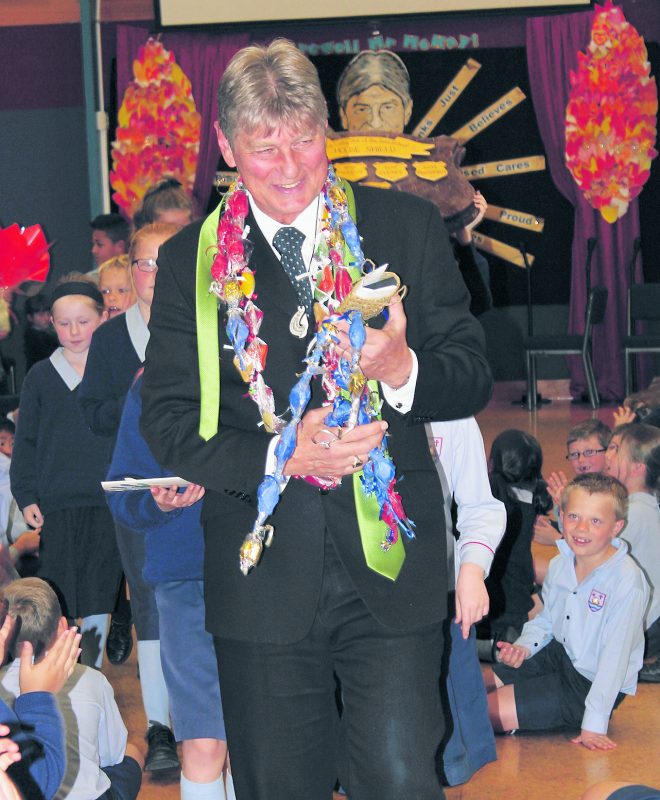by PETER GRACE
Catholic schools aren’t quite fulfilling their roles as missionary schools, according
to resigning primary school principal Ken McKay of Howick.
Mr McKay was farewelled from Our Lady Star of the Sea in Howick on September 19, after he decided to resign because of ill health.
Before his farewell, Mr McKay told NZ Catholic that over his years of teaching there had been a huge change in government ideology and input into schools.
“At the moment it’s one size fits all, and that’s not correct,” he said.
Children are different. Their academic abilities, and their social and physical makeup varies. So treating them as the same puts huge pressure on schools.
At Our Lady Star of the Sea, tikapono and aroha are emphasised. “And I believe, when I started teaching education was reasonably equitable.”
But that has changed. “I don’t believe that now — when you have got 270,000 kids on the poverty line, or in poverty.
And there’s certainly no justice for those children and I think, as Catholic schools, we have to be mindful of that too, because in the end Catholic schools are missionary schools.”
With respect to the schools’ missionary role, awareness is needed that there are children who Catholic schools should be enrolling.
“Unfortunately, the proprietors are probably unable to agree to that because they are dealing with a government and the minister and funding…
“The Catholic school as a missionary school is not as strong as it could be. And it’s because of the influence of the government, because if the proprietors don’t agree, they don’t get the funding.”
The Catholic community has to be aware that, because of integration, there has to be political input into Catholic schools, Mr McKay said. “That’s not a negative comment. That’s a comment of understanding.”
Mr McKay grew up on a farm out of Dannevirke and his first teaching job was at a state school in Dannevirke.
But even in the state system in his first year as a beginning teacher at a reasonably large school, he was organising sports days, community days, coaching teams — setting him up for his teaching future.
“I had experience, but it also gave me a look into administering schools. Because I had already had responsibility with budgets and human resources and so on.”
In 1978 he transferred to St Joseph’s Primary School, Pukekohe. When he moved to Otorohanga in 1981, as principal, the school consisted of three rooms that had been used by the military during the war and later moved on to the site. “When I went there, there was a roll of 28, and when I left, 58 — and a new school.”
He returned to Pukekohe in 1986 and in 1989 became the first Catholic teacher to get a position through an international exchange.
He went from Pukekohe to St Francis Xavier in Whangarei in 1995. St Joseph’s had a roll close to 400, whereas St Francis Xavier was only 178, so the move was also to a lower salary.
When he left four years later, the roll was about 470.
In 1999 he was persuaded to go to Our Lady Star of the Sea, which then had a roll of 238, meaning another drop in salary.
“For me it was not about money. I had to talk to Jane, my wife,fairly hard!
“It was about career, it was about justice and it was about doing the right thing, about being loyal to the Catholic system.”
In his more than 30 years as a principal, Mr McKay said, the decline in male teachers has been obvious.
“I think there’s a lack of male role models in the primary system. When I started teaching in the 70s, it was probably 50:50. “We have a staff of 53 [at Star of the Sea] and [the males] are myself, the caretaker and a 0.8 teacher.”
It had been a huge change, Mr McKay said, and the biggest impact he had noticed was in the 1990s when Peter Ellis lost his job at the Christchurch Civic Creche and was prosecuted for sexual abuse.
“I think that was a determining factor … That, I believe, was a turning point.”
Even he had been scolded, Mr McKay said, for picking up a girl who had fallen over. “That’s the impact. Thank God the mother [of the fallen girl] was there.”
Teaching had changed in another significant way. In the past, women often started out in teaching, left to have their families, then came back when their children were of school age. “And it strengthened your school incredibly.
“That doesn’t happen any more. Most of those who go away come back as relief teachers.”
So there are two big contributors to the lack of men in schools. “I think that [case] in Christchurch was one, and I think this is another.”
Despite the challenges in education, he would never do anything else, Mr McKay said.
“I have loved it. The people, the Gospel values. It’s wonderful. It has been a wonderful
faith-fulfilling career for me. And I have worked with and amongst wonderful people. And I
am talking about community, about children, about staff, about respected colleagues.”
He thinks the Catholic system in New Zealand is still extremely valuable, he said. “It leads
by example in terms of values and academic [achievement], in terms of mission and missionary.
Missionary and academic, there has to be balance, about opportunities for young people, and we
have to make that happen.”
The other thing he would say is about Catholic social teaching and changing ethnicities.
“Catholic schools need to be very strong in understanding different ethnicities, and that’s why they need to work very much with the school community and represent who they are and who the school is.”


Reader Interactions